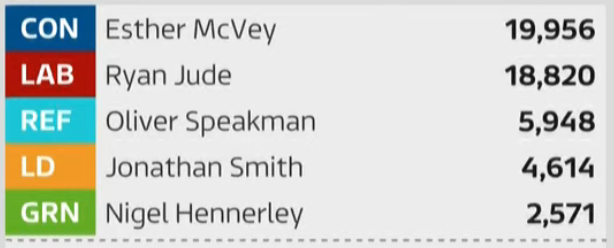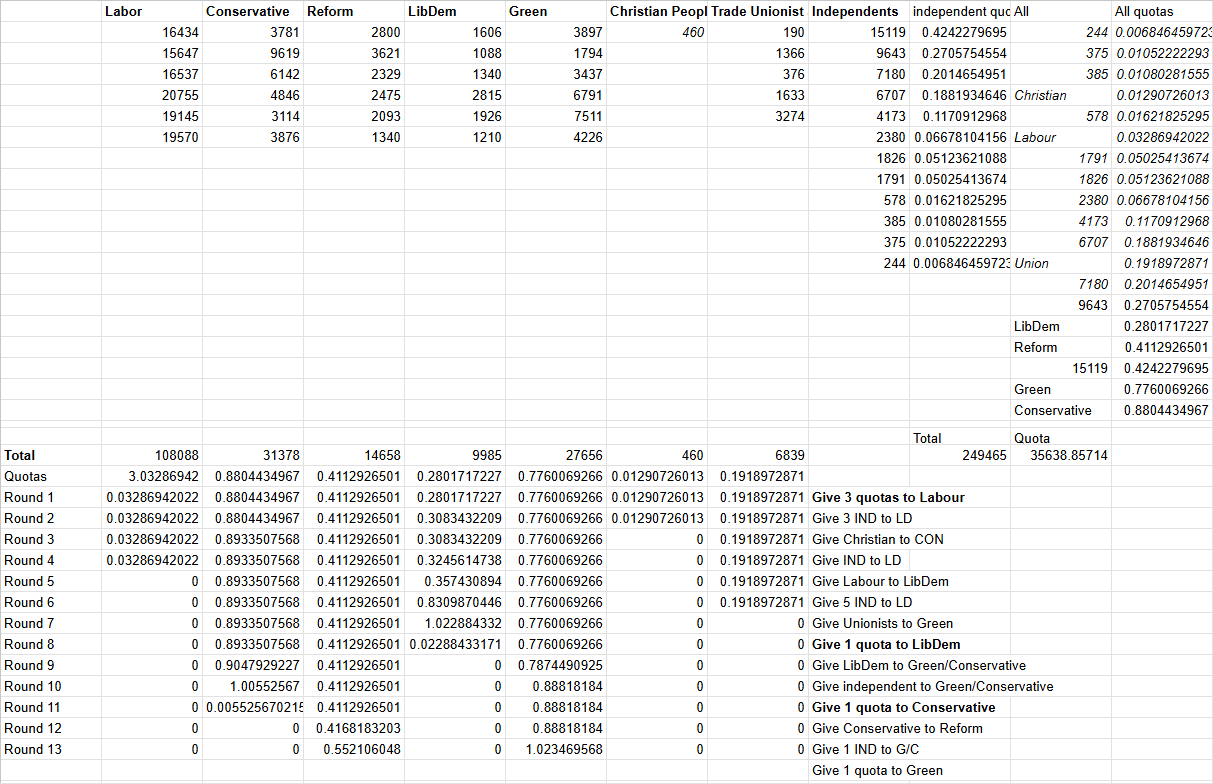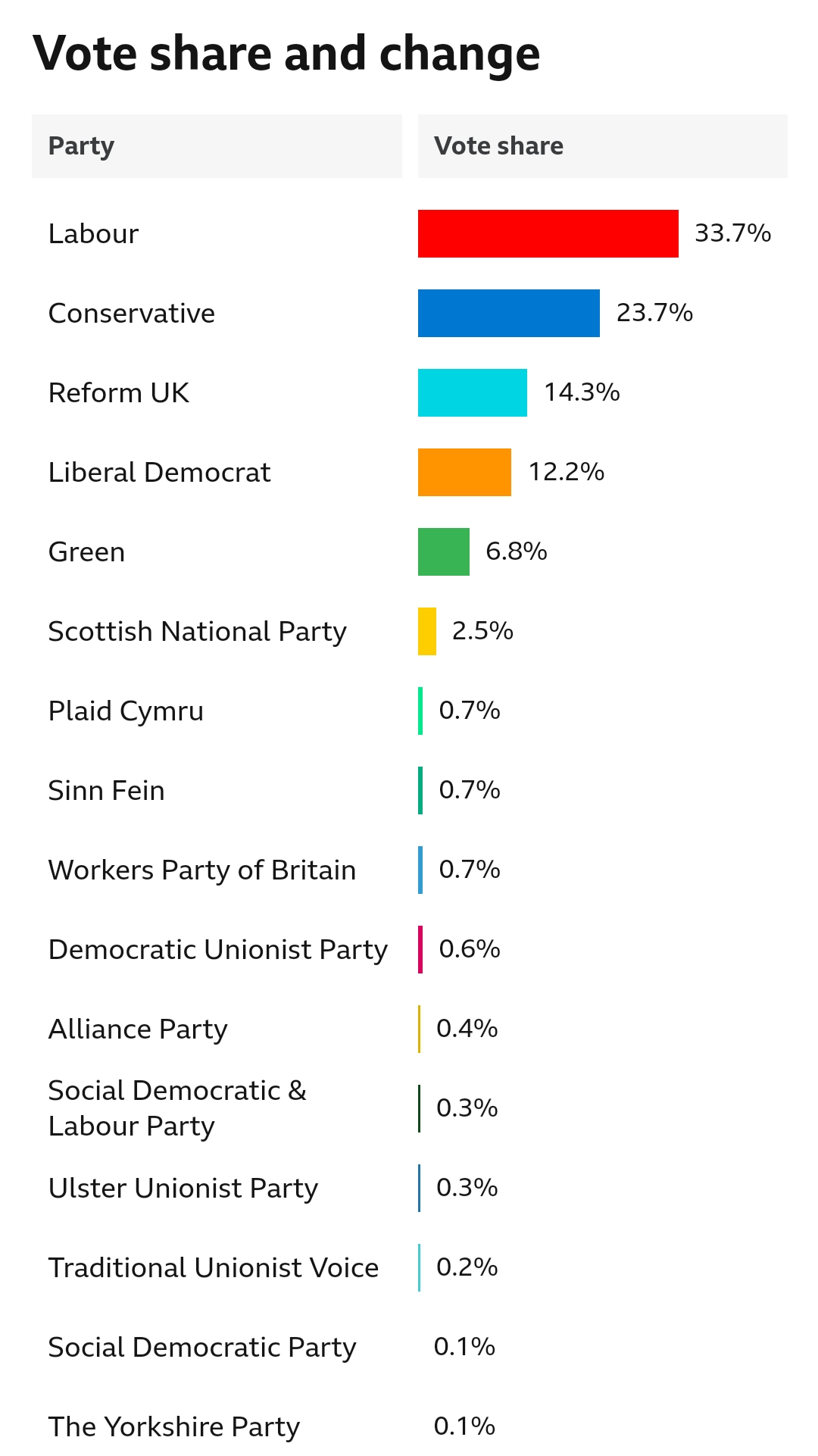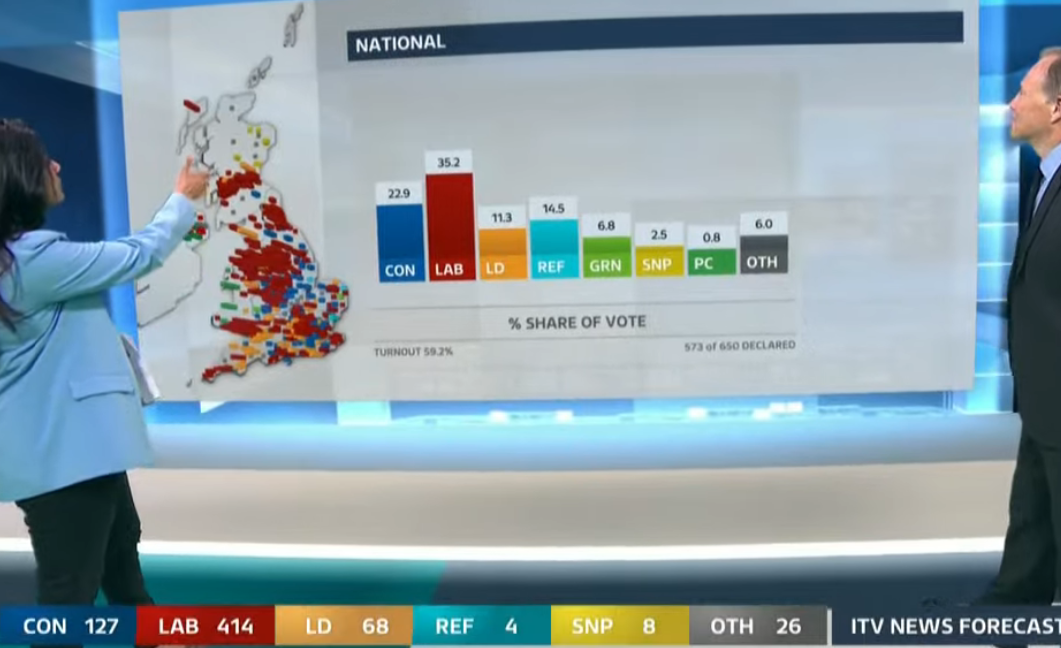I’m watching the ITV feed on YouTube. Dunno what other people actually from the UK would recommend because I don’t really know the British media landscape.
They’re currently discussing the issue of Scottish independence. I must say, I find it very frustrating, including from Nicola Sturgeon. As a complete outsider, it would seem to me the number 1 reason in favour of a second referendum is very simple: “you’ll not be allowed back into the EU if you secede from the UK” was a major campaign point during the first referendum. And then 2 years later England voted to leave the EU anyway. How is Sturgeon not bringing this up?
They bring that up regularly, but it’s a false equivalence. At the time of the independence vote it was absolutely true to claim that voting No was true best way to stay in the EU. There was no expectation, none, from anyone that Brexit was on the way. So, at the time, if Europe was the issue then voting to stay in the UK was the logical choice to make.
As for now - well, Swinney (and before him Sturgeon herself) was talking in terms of winning a majority of seats being a mandate for opening independence talks. That’s clearly nonsense, since a majority of seats is possible with a fairly small plurality of votes. And, it’s looking like it’s a moot point anyway, since the SNP seems to have taken a right good kicking this time round.
So Sturgeon is probably not bringing this up tonight because she’d look ridiculous to do so given the (apparent) results in Scotland tonight. If this was a referendum on independence as she and Swinney have suggested, then the result would appear to be a solid No.
I’m watching the ITV feed on YouTube. Dunno what other people actually from the UK would recommend because I don’t really know the British media landscape.
ITV will be just fine. The Beeb’s coverage is usually pretty definitive.
Unfortunately BBC doesn’t seem to be live streamed on YouTube. Or if it does, it didn’t turn up in my search. I was choosing between ITV, Sky News (I know Sky in the UK isn’t quite the same as Sky here in Aus, but the stink of that name is very hard for me to shake off), something called “TalkTV”, and two separate feeds from “The Times and The Sunday Times”. Oh, and CNN, but that’s just silly.
Ree Smog is out! I repeat, Ree Smog is out!
Yes, despite many leftists decrying Labour’s centreward shift, I think this is a good result. This result was helped by that shift in no small part.
Starmer is very well spoken and his morning after speech does well to inspire confidence.
This is clearly a great result, but I think that given the popular vote, that it’s important to accept that this election was anti-tory, not pro-labour.
Labour have five years to make a substantial tangible change in people’s lives or we may very well find ourselves back where we left off or even worse.
Top hat wanker! Truss lost too, this is amazing.
Oh good, so now Truss can now piss off too the US and moan about the apparent conspiracy that was against her all she likes, and it won’t inconvenience her constituents anymore.
And of course no one in the US will really care, because will have no idea who the hell she is.
Is she that head of lettuce who killed the queen?
Countdown to Smog reappearing as a Reform candidate?
I do love the trend of Returning Officers wearing silly hats.
I believe most of those are mayors in their official garb.
UKIP still exists? Wat?
I do like that Farage tries to call himself “centre-right”.
On the other hand, I unironically do like that he calls out how shit FPTP is.
The one thing i can agree with reform on is electoral reform. unfortunately all the racism, homophonia and general goose-stepping made it so i couldn’t vote for him.
Plus lib dems are better placed to actually make it happen.
unfortunately i was one of the absolute tools that voted no on the AV vote back in 2010ish
The fuck happened in Leicester East that it’s the sole Con gain in the country?
Their last two Labour MPs not only were kicked out in scandal, but also ran in this election splitting the vote. It looks like the Lib Dems also got a significant vote share which has helped the Tories.
Makes sense. Thanks
tories lost, labour didn’t win. labour’s vote share plunging in constituencies they won is terrible for starmer’s hope for a long mandate.
Just seen Count Binface arrive for the count, shit just got real.
Aaaand majority!
You just love to see it
I figure satire articles probably aren’t allowed in the general community, but hopefully it’s ok in the megathread? This was brilliant.
https://theshovel.com.au/2024/07/05/australia-loses-shortest-time-to-5-pms-ashes/
They even brought in Rudd for a second go, which didn’t seem to be within the spirit of the game if I’m honest, but that’s Australia for you.
Is a particularly biting bit of satire on the way we usually hear about sports reporting.
Anyone got that link that recalculates the results of the GE by different voting systems? For example if we had a form of PR how would this election turned out? I swear it was posted here a few days ago.
Direct proportional representation is easy enough. Just look at the number of votes each party got, and assign that percentage to their overall parliamentary representation. That roughly gives you the answer.
IRV is more interesting, but more complicated. It relies on some assumptions (e.g. Green, SNP, LibDem, Labour all preference each other 100%, Conservatives & Reform preference each other 100%) and takes a lot of effort to do on a seat-by-seat basis. And of course it all assumes ceteris paribus, when in actuality people would vote differently if the voting system were different.
As one example, here’s the seat of Tatton:

Under IRV, with the above assumptions, Labour’s Ryan Jude would have won with 26,005 votes to Conservative Esther McVey’s 25,904. But tweak those assumptions just slightly (give 90% of LibDem votes to Labour, 10% to Conservatives) and it could go the other way (26,365 CON to 25,544 LAB). There are dozens or scores of seats where these sorts of interesting hypotheticals can be asked and analysed. IRV is actually, in my opinion, the next-worst voting system after FPTP (if you exclude weird and rarely-used ones like approval voting, range voting, etc.), but it’s one of the most interesting to do analysis with.
STV is an utterly impossible comparison to make, because it relies on multi-seat electorates, which would probably be done by merging existing electorates into groups of 3–8. STV is a more generalised case of IRV so if you decided on how to do those merges, then you can get even more interesting analysis. As one example, if we imagine a merged electorate involving West Ham, East Ham, Ilford North, Ilford South, Leyton & Wanstead, and Stratford & Bow. Some assumptions are necessary to make this work, my assumption is that anyone whose party name says “workers” or “socialist” preferences Green and then Labour, while those mentioning religion preference Conservative, and if I don’t know, I’m giving them to LibDems then Labour. I’m also assuming all voters for a named party vote as a block, preferencing the same candidate 1st, 2nd, etc., while independents get the votes as they were actually given. This is somewhat realistic because ballot paper design can be set up to encourage this in an STV context (see how Australia does it with “above the line” voting in the Senate, for an example). I’ve merged the minor parties named “workers” or “socialist” into a single party.
A detailed explanation of my calculation is contained here.
In our merged hypothetical under STV, they win 3.03 quotas on first preference, Conservative wins 0.88, Reform 0.41, LibDem 0.28, Green 0.78. So Labour immediately win 3 seats, before 0.03 quotas are distributed lower down in their party. After numerous more rounds (my attached spreadsheet simplifies multiple rounds that by eye would obviously not result in a new quota being reached being merged down into 1), the LibDems win a quota. I’ve decided to distribute their excess 50/50 to Green and Conservative, since Labour has already been eliminated. To be frank, after that I’m not sure what to do. LibDems having been eliminated, the 3 remaining independents can’t go to them as was my initial plan (the basic thinking being independents are probably more centrist, but LibDems and Labour being eliminated already. I’ve decided to give them 50/50 to Conservative and Green, but the reality could be so, so much more complex. After one of those is eliminated, Conservatives get a quota. One final independent distributed to Conservatives/Green and the Greens win the last quota.

This is Labour heartland and in FPTP Labour won all 6 of these seats. My calculation ends up with 3 Labour, 1 LibDem, 1 Conservative, and 1 Green.
MMP ends up with basically the same overall result as direct proportional, but can be interesting in terms of independents & very minor parties and resulting overhang seats.
Given, many systems require more than just marking one box. While, even those that do not, would drastically change how people choose their vote.
I am unsure any such site can give a realistic result from available data?
Edit:
If we just assume proportional based on % of vote yesterday.
Tor 22.9% Lab 35.2% LDe 11.3% Ref 14.5% SNP 2.5% Oth 13.6%
It is bloody hard to see how either party could form a viable 50% Lab LD SNP and a few independents would take it over 50. But honestly, it is hard to imagine that working with the politicians voted yesterday. Tory Ref would need all independents. So less likely to work.
But as I said. Voters would go to the polls with very different ideas about how to vote.
Tory Ref would need all independents
“Other” is not all independents. 6.8% of the vote share was Green, and 0.8% is between Workers Party and Social Democratic Party who, based purely on the names, I cannot possibly imagine would ever back the Conservatives. Unless LibDems were to support that coalition (which, after the 2010 Government I cannot imagine they’d be super keen on), there is no path to a Tory Government from these results under a proportional system. Labour can form a Government with just LibDem, SNP, and Green parties.
Exactly, total up left(ish) votes and you get about 54% ✊️

Reform didn’t gain many seats but came 3rd in total votes
I’ve just switched over to watch Sky News’ feed on YouTube. The allow chat, which for a serious news organisation is absolutely wild to me.
And the chatters are absolutely insane. Not in a good way. There’s no attempt to discuss anything, just people spamming “💙💙 REFORM IS RISING 💙💙” and “🟥🟥 Labour Forever 🟥🟥🟥🟥”. And weirdest of all, many variations on “netherite helmet trim”.
Wtf does netherite helmet trim mean?
the proper way to watch youtube chat is to click on the x.
Ha! Ok that got a serious laugh from me.
But honestly, other YouTube live streams I’ve watched have actually had really great chats. Lots of fun discussion with other chatters or between chat and the streamer. I wouldn’t expect a news org to be engaging with the chat themselves, but I would have hoped that chat could talk amongst themselves in a civil manner. I’m kinda disappointed how they’re not.
i’m actually only half serious since there are a lot of channels i watch that are great communities too. just not the political ones :)
Minecraft.
And the chatters are absolutely insane. Not in a good way. There’s no attempt to discuss anything, just people spamming “💙💙 REFORM IS RISING 💙💙”
Reform have an online army that swarms comment threads. Not sure how many of them are based in Russia.
Minecraft
Oh yeah I worked that out thanks to Google. But I don’t get the connection to the election, or why so many people were spamming it.
Trolls I suppose.
Memecraft
So looking forward to the next five years…
Looking at how Reform and Lib Dems made significant gains in vote share you have to wonder if its still worth Labour chasing after the right wing vote that Reform achieved. I just do not see the where the voters who voted Reform actually believe Starmer on the key issues that Reform campaigned on, immigration, anti “woke”, and Brexit. I cannot see Labour ever gaining the lead on those issues over someone like Farage who will always position himself to the right of whatever Labour or the Tories campaign on. I cant even see Labour being trusted at the voting booth on these right wing issues over a rebuilt Tory party. Its a fools errand to try.
The Lib Dem vote share, as with Reform, boosted by previous Tory voters but Lib Dems campaigned on almost the opposite of Reform (with some tactical, local, NIMBYism) and achieved way more seats on a lower overall percentage vote than Reform. If you are going to pick a direction to go in, wouldn’t it make more sense to move towards the Lib Dems position to shore up in time for the next election?
Labour did worse total percentage of the vote than 2017, its more that the Tories collapsed losing about 20% of their vote that caused this swing in seats. The Tories will rally next time around and a lot of the seats look winnable for them with only a small local swing. The current stance of Labour simply isn’t popular enough to be a vote winner against a rebuilt Tory party.
As an Australian, I have to once again apologise on behalf of my nation for the turd in a tuxedo that is Rupert Murdoch.
Carol Vorderman is completely plastered on the C4 programme lol
First Past the Post, everybody:

That’s:
- Conservatives: 19.5% of seats from 22.9% of the vote
- Labour: 63.7% of seats from 35.2% of the vote
- LibDems: 10.5% of seats from 11.3% of the vote
- Reform: 0.6% of seats from 14.5% of the vote
- SNP: 1.2% of seats from 2.5% of the vote
- Others: 4% of seats from 13.6% of the vote
“The conservatives and lib dems look pretty proportional to me. 10/10 voting system” /s
The British were given the choice and voted against proportional representation. They deserve the duopoly and everything that flows from that e.g. terrible healthcare, the illegal war in Iraq, royals, pointless and expensive aircraft carriers. They chose to leave the only institution that is defending their basic freedoms. These bigoted Dunning Kruger morons cannot be told.
The British were given the choice and voted against proportional representation. They deserve the duopoly and everything that flows from that e.g. terrible healthcare, the illegal war in Iraq,
And time travelling powers apparently 🤣🤣😂.
🤡
What’s wrong with Pointless? It beats the shit out of most game shows.
What an utterly moronic stance that stems totally from your complete lack of understanding of what was actually offered.
Proportional representation was never on the table, what was offered was single transferable vote, which would keep the first past the post system but add the option to transfer your vote to another candidate if your preferred candidate lost. There was never proportional representation stop with the false narrative.
Instant Runoff was on the table in the 2011 referendum. Very similar to STV, but generally STV is what’s referred to in a multi-winner situation. Australia uses STV in the Senate, as does the Irish Dáil. IRV is what Australia uses in the House of Representatives, and a few areas of the US, like Maine. STV actually is a proportional (or at least quasi-proportional) system, unlike IRV.
But you’re right that unfortunately proportional representation has never been on the table in the UK. I don’t agree with the guy’s more recent takes on comedy and “free speech”, but I have great respect for the fact that this is something John Cleese has been on about since 1987. And again in 1998. And most recently in 2018.
The reason a lot of people voted against it was that there was a concern that if it was implemented the government would consider themselves to have taken action and would just shut down any talk about proportional representation by arguing that we already had it. Even though we wouldn’t have.
The theory was that by not voting for the weak source option the idea of proportional representation could be floated at a later date, and to be honest I actually agree with the analysis.
And the depressing thing is that it will never change because the only parties with the power to change it benefit from the current system.
You came so close in 2011. I wonder what could have happened if Clegg had stuck to his guns and insisted on a referendum on a proportional system, to remove the “progressive no” (to borrow a term from a recent Australian constitutional referendum) argument against the reform.
The Lib Dems got so excited about being granted a referendum that they forgot to take it seriously.
AV was a terrible system and arguably worse than FPTP. It’s a more complicated system for people to vote in, and would potentially lead to even more disproportionate results.
and arguably worse than FPTP
Sorry but no. Absolutely no. The only downside is the ability to use it as an excuse not to upgrade to a proportional system in the future.
More complicated? Yeah, I guess. But not enough to actually matter. Not unless you think British people are just exceptionally stupid compared to Australians.
More disproportionate results? Impossible. They’re both single-winner systems. The key difference is that FPTP allows a plurality to win while IRV requires a majority. It might create a situation where it seems less proportionate, but that’s only because you reduce strategic voting so people are voting their true beliefs, so candidates that weren’t going to win under either system end up getting more votes under IRV. But the ultimate result is that the candidate who wins in each electorate is the one who had the most support.
The two largest parties got less than 60% of the national vote but over 80% of seats. FPTP is preventing us from being what we are: a multi party democracy.








